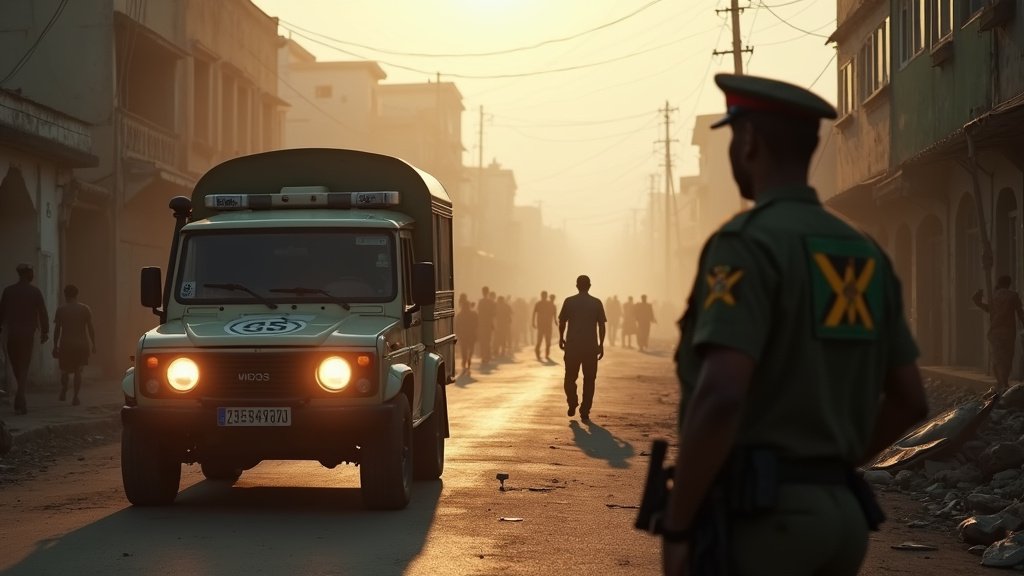Jamaica has officially joined a pivotal Group of Standing Partners tasked with overseeing the United Nations-authorized Gang Suppression Force (GSF) in Haiti. This significant development marks a crucial step in the international community’s efforts to combat the escalating gang violence and profound humanitarian crisis plaguing the Caribbean nation. The news underscores Jamaica’s commitment to regional security and stability.
The New Gang Suppression Force (GSF) Deployed
The newly formed Gang Suppression Force (GSF) is a multinational mission authorized by the UN Security Council, designed to tackle the pervasive issue of gang control in Haiti. With a mandate initially set for 12 months, the force will comprise 5,550 personnel. Its core objectives are to work in close coordination with Haitian authorities, particularly the Haitian National Police (HNP), to neutralize armed gangs, secure critical infrastructure, and ensure unimpeded humanitarian access. The overarching aim of the GSF is to protect vulnerable populations from escalating violence and prevent further displacement.
This robust force replaces the previous Multinational Security Support (MSS) mission, which concluded its operations on October 2, 2025. The MSS, led by Kenya, had faced considerable challenges, including chronic underfunding, insufficient personnel, and limited operational capacity, making it difficult to contend with the scale of the crisis. The GSF represents a larger and more comprehensive approach, backed by a broader mandate and the establishment of a UN Support Office to provide essential logistical and operational assistance.
Haiti’s Deepening Crisis
Haiti has been grappling with an unprecedented security and humanitarian crisis since the assassination of President Jovenel Moïse in 2021. Armed gangs now control an estimated 90 percent of the capital, Port-au-Prince, as well as significant swathes of the country. This pervasive violence has resulted in widespread kidnappings, sexual assaults, killings, and the disruption of essential services.
The human cost is staggering, with over 1.3 million people internally displaced and seeking refuge in precarious conditions. Food insecurity has reached critical levels, with nearly half of Haiti’s population requiring humanitarian assistance. The violence has also severely hampered humanitarian access, limiting the ability of aid organizations to reach those most in need.
Jamaica’s Role and Rationale
Jamaica’s participation in the Group of Standing Partners is driven by a commitment to regional solidarity and its own national security interests. Minister of Foreign Affairs and Foreign Trade, Senator Kamina Johnson Smith, has consistently voiced Jamaica’s concern over the deteriorating situation in Haiti. She emphasized that the international community, and specifically Jamaica, must do its utmost to support Haiti, highlighting that “failure is not an option for Haiti. It’s not an option for the region. It’s not an option for Jamaica”.
As a member of the Group of Standing Partners, Jamaica will contribute to the strategic direction, oversight, and political decision-making for the GSF mission. This involvement is an extension of Jamaica’s long-standing diplomatic engagement with Haiti, including its advocacy through the Caribbean Community (CARICOM) for a sustainable, Haitian-led resolution to the crisis.
International Support and Future Outlook
The UN Security Council’s resolution authorizing the GSF was co-sponsored by Panama and the United States and adopted with 12 votes in favor, though China, Pakistan, and Russia abstained, raising concerns about the mission’s mandate and funding. The effectiveness of the GSF will depend on sustained international support, including voluntary contributions for personnel costs, as well as robust human rights safeguards.
While the GSF represents a significant escalation of international commitment, experts stress that security alone will not resolve Haiti’s multifaceted challenges. Complementary efforts in humanitarian aid, governance reform, and long-term development are essential for the country’s recovery. Jamaica, as part of the Group of Standing Partners, is poised to play a key role in ensuring this complex mission contributes to restoring peace and stability in Haiti, offering a vital pathway towards a more secure future for the island nation and the wider region. This news, particularly concerning Jamaica’s headline involvement, signals a renewed international resolve.

